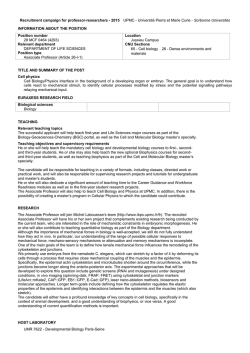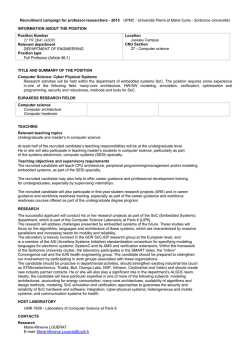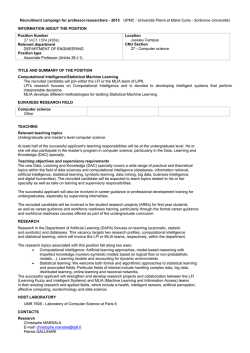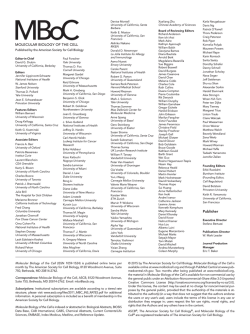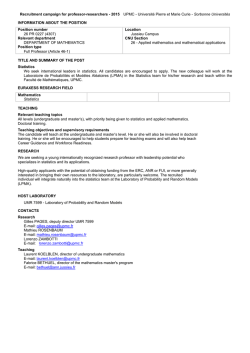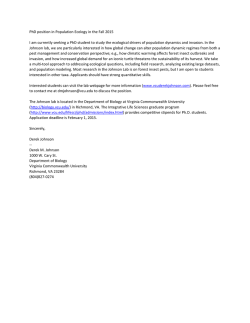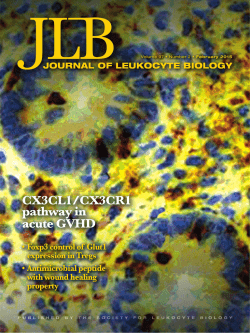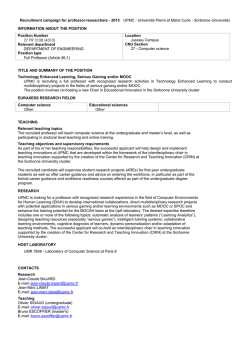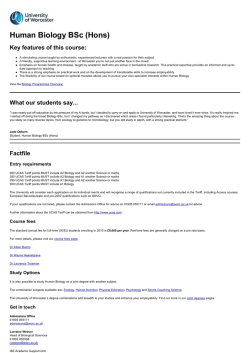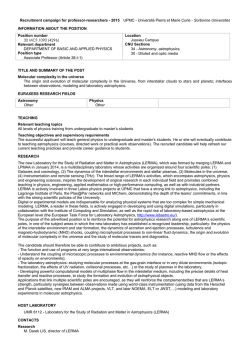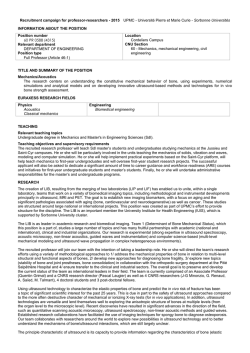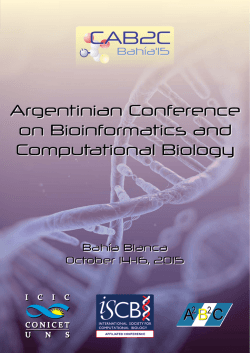
Cellular Biology - Université Pierre et Marie CURIE
Recruitment campaign for professor-researchers - 2015 UPMC - Université Pierre et Marie Curie - Sorbonne Universités INFORMATION ABOUT THE POSITION Position number 65 MCF 1215 (4304) Relevant department DEPARTMENT OF LIFE SCIENCES Position type Associate Professor (Article 26-I-1) Location Jussieu Campus CNU Section 65 - Cell biology TITLE AND SUMMARY OF THE POST Cellular Biology The candidate will integrate one of these teams: C. Neri, UMR 8256 B2A (Molecular systems biology of neuronal stress resistance, V. Galy, UMR 7622 LBD (Targeting and degradation of sperm mitochondria after animal fertilization), E. Huillard, UMRS 1127 ICM (Development of new models of glioblastoma). EURAXESS RESEARCH FIELD Biological sciences Biology TEACHING Relevant teaching topics The candidate will help teach the undergraduate Life Sciences program (second- and third-year students) and the Cell and Molecular Biology master’s specialty, as well as teaching first-year undergraduates (BGC portal, first-year medical studies: PAES). Teaching objectives and supervisory requirements The candidate will help teach directed projects and practical experience as part of the introductory biology courses for first-year students and the Life Sciences undergraduate degree program. He or she will specifically help teach the cell biology and developmental biology courses as part of the Life Sciences undergraduate degree and the Cell biology, Developmental biology & Stem cell biology specialty within the Cell and Molecular Biology master’s program. The candidate will also dedicate a significant amount of teaching time to the Career Guidance and Workforce Readiness modules as well as the first-year student research projects. RESEARCH The candidate will join one of the following three teams: 1) C. Neri’s team, Laboratory of Biological Adaptation and Aging (B2A): The candidate will develop a research project with the ‘Biology and Neuronal Pathology’ team of the CNRS department’s Laboratory of Biological Adaptation and Aging as part of the new Institute of Biology Paris Seine. The project will study how the ability of neurons to preserve their function and resist proteotoxicity is regulated by the primary longevity pathways during the preliminary phases of neurodegenerative diseases such as Huntington (see Tourette et al. PLoS Biology 2014). This project will include the study of regulatory mechanisms and the biological relevance and functional impact of gene regulation by FOXO factors. Our research focuses on the role of the cellular stress response in maintaining neuronal identity using an approach that combines C. elegans genetics, the biology of induced pluripotent human stem cells (iPSCs) and mouse genetics. The research team benefits from frequent use of computational modeling systems, high-resolution cell imaging techniques and an international network of collaborators, offering the candidate a supportive environment for innovative research in the field of neuronal longevity and neurodegenerative diseases while also providing a rich cohesive basis for training in cellular biology. 2) V. Galy’s team, Laboratory of Developmental Biology Paris-Seine (LBD): The candidate will join the “C. Elegans Heredity and Development” team within the laboratory of Developmental Biology at IBPS to study an enigmatic aspect of sexual reproduction: the cellular and embryonic mechanisms responsible for uniparental maternal inheritance of the mitochondrial genome. This field of research is poorly explored, even in humans, where very advanced techniques for medically assisted reproduction could interfere with natural cellular and embryonic mechanisms. In most animals, the mitochondrial genome is only transmitted by the mother’s oocyte, while, paradoxically, the paternal sperm mitochondria penetrate the egg during fertilization. Previous observations have suggested that the paternal mitochondria are eliminated post-fertilization, but the mechanism remains unknown. Using C. elegans, we have demonstrated that autophagy, a cellular catabolism pathway, is involved in their degradation (Science, 2011). The recruited professor-researcher will study the mechanisms controlling the dynamics and fate of sperm and oocyte mitochondria as well as their genomes in the embryo, primarily by using cell biology, molecular biology and live embryo imaging approaches. He or she will also join our ongoing effort to identify the targeting mechanism for sperm mitochondria. We anticipate using a model system to complement the C. elegans studies that will enable the manipulation and injection of gametes, which could be supervised by the recruited professor-researcher if he or she has demonstrated experience in the use of this model (mouse or sea urchin). These advances will ultimately enable us to test the impact on the embryo of maintaining and inheriting paternal mitochondria. 3) E. Huillard’s team, Institute of the brain and the spinal cord (ICM): This team, created in 2012 within the framework of the ATIP-AVENIR program, is interested in the cellular and molecular mechanisms involved in the development of glioblastomas, that most aggressive primitive cerebral tumors in adults. We are seeking a professor-researcher to enhance our team and help train doctoral students and post-doctoral fellows. The recruited professor-researcher will be responsible for a project whose goal is to characterize new in vivo glioblastoma models. These models will allow us to identify and characterize the different stages of tumor development, to determine the sequence of changes that are required for tumorigenesis and to understand the mechanisms of resistance to treatment. These models will also allow us to identify factors whose functions could be crucial in the development of cerebral tumors and that could serve as potential therapeutic targets. Finally, these models could be used as preclinical platforms for testing targeted therapies. Required skills: solid training in molecular biology, cell biology, genetics and animal experimentation (rodents). The candidate should have a strong knowledge of cancer biology and neurobiology. Experience in researching the biology of cerebral tumors would be ideal. HOST LABORATORY UMRS 8256 - Biological Adaptation and Aging UMR 7622 - Developmental Biology Paris-Seine UMRS 1127 - Institute of the Brain and Spinal Cord (UMRS 1127 / UMR 7225) CONTACTS Research Christian NERI Telephone: (33) 1 44 27 60 45 E-mail: [email protected] Vincent GALY; Telephone: (33) 1 44 27 34 94 E-mail: [email protected] Emmanuelle HUILLARD Telephone: (33) 1 57 27 40 99 E-mail: [email protected] Teaching Hélène POUZET E-mail: [email protected] Joëlle SOBCZAK E-mail: [email protected] Pedro BAUSERO E-mail: [email protected] Sophie LOUVET E-mail: [email protected] MANDATORY INSTRUCTIONS FOR PREPARING YOUR APPLICATION As UPMC has opted for a paperless application procedure, please ensure that you follow the instructions below exactly to facilitate optimal handling of your application. Candidate registration will involve two steps: ● 1st step: from 10 am Monday, February 2, 2015 to 4 pm Tuesday, March 10, 2015 REGISTER your candidacy using the GALAXIE application, which can link: https://galaxie.enseignementsup-recherche.gouv.fr/antares/can/astree/index.jsp be found at the following ● 2nd step: from 10 am Monday, February 2, 2015 to midnight on Tuesday, March 10, 2015 REGISTER AND UPLOAD ALL FILES for your application at the following link: http://concours.upmc.fr The application must contain the following items, according to the current regulations (decrees of October 7, 2009), in PDF format: 1. a dated and signed declaration of candidacy, which can be downloaded on GALAXIE; 2. a clear copy of photo identification, front and back; 3. a curriculum vitae (cf. article 10 of title IV of the decree of October 7, 2009); 4. a diploma: doctorate, HDR (habilitation à diriger des recherches) or equivalent; 5. the thesis committee report approving the thesis defense/viva; 6. at least one representative example of the work, publications, articles and achievements cited in the CV; 7. additionally, for candidates who are applying in these cases: 7a) as a transfer: certification from the original institution confirming the quality of the professor or lecturer and active performance of the duties associated with the position for at least three years by the closing date for applications; 7b) for a secondment: recent certification from the current employer citing which category the candidate falls into as outlined by article 58-1 of decree No. 84-431 of June 6, 1984 concerning the status of research professors and the quality of the position holder in the context of the original position for at least three years at the closing date for applications; 7c) as a professor-researcher who holds a similar position in a country other than France that is equivalent to the advertised position and is therefore exempt from evaluation based on the list of qualifications: recent certification from the current employer citing the institution that the candidate belongs to, the duration of employment and the level of duties performed; 7d) under article 46-3: certification from the original employer establishing the quality of the full professor or associate professor as regulated by decree No. 84-431, modified on June 6, 1984, and the duration of employment, in accordance with article 46-3 of the aforementioned decree. Administrative documents in foreign languages must be translated into French. All relevant information regarding the professor-researcher recruitment can be found on the UPMC website at the following address, under the heading ACTUALITES (NEWS): http://www.upmc.fr If you have any questions, you can contact the administrative team at [email protected]. PAPER APPLICATIONS WILL NOT BE ACCEPTED
© Copyright 2026
